人教版新课标必修4 Unit 2 Working the land Grammar--动词-ing 做主语和宾语(共44张 PPT )
文档属性
| 名称 | 人教版新课标必修4 Unit 2 Working the land Grammar--动词-ing 做主语和宾语(共44张 PPT ) | 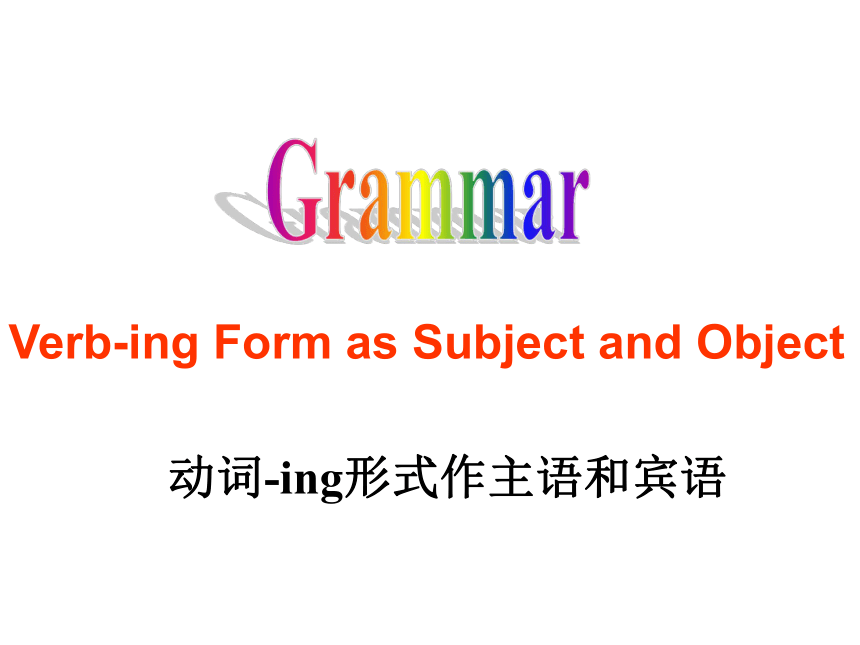 | |
| 格式 | zip | ||
| 文件大小 | 271.3KB | ||
| 资源类型 | 教案 | ||
| 版本资源 | 人教版(新课程标准) | ||
| 科目 | 英语 | ||
| 更新时间 | 2020-06-13 15:24:37 | ||
图片预览


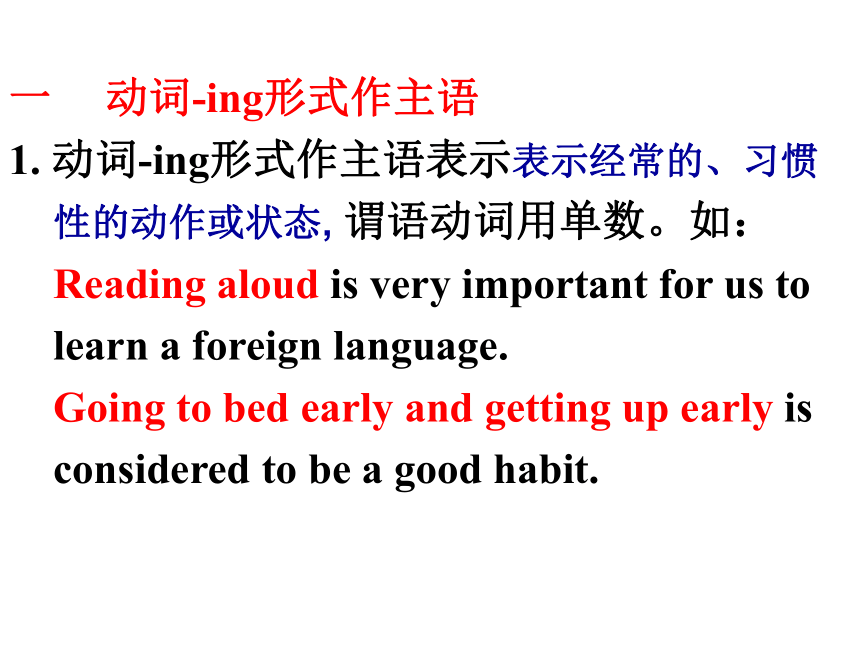
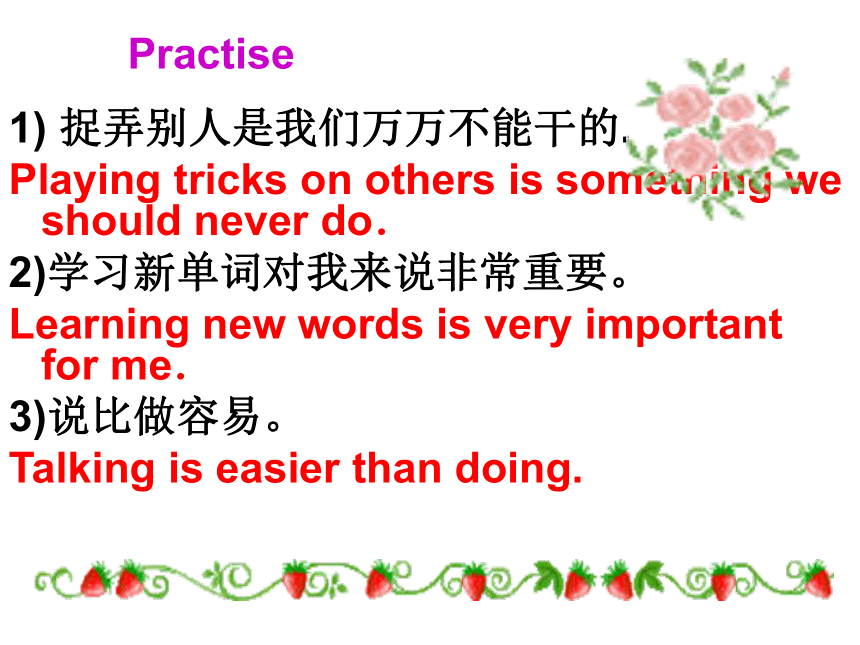
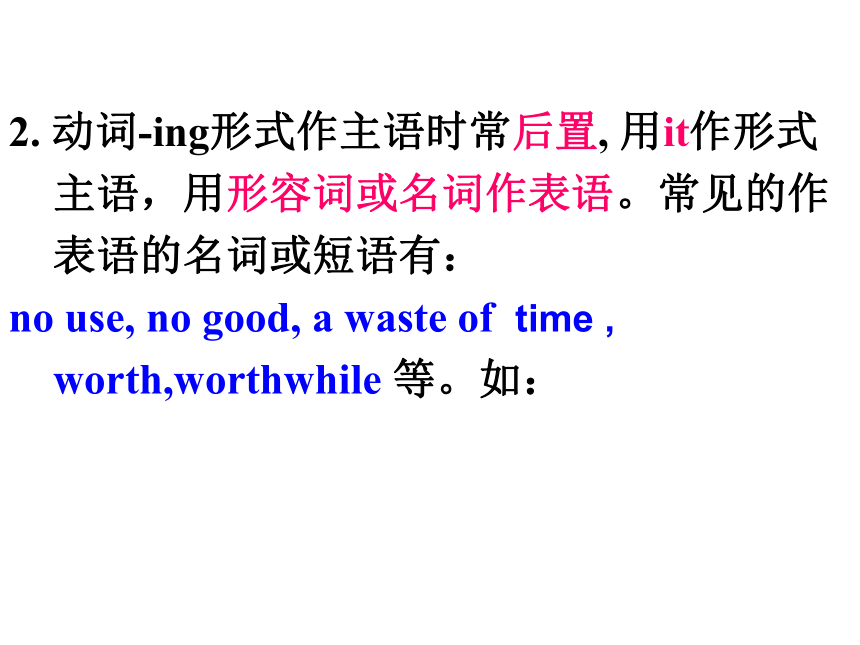
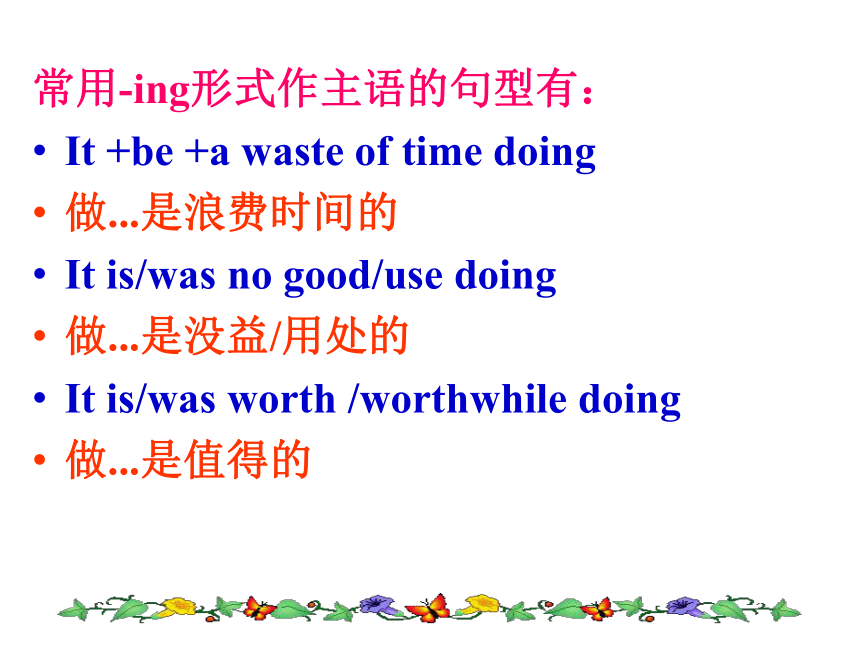
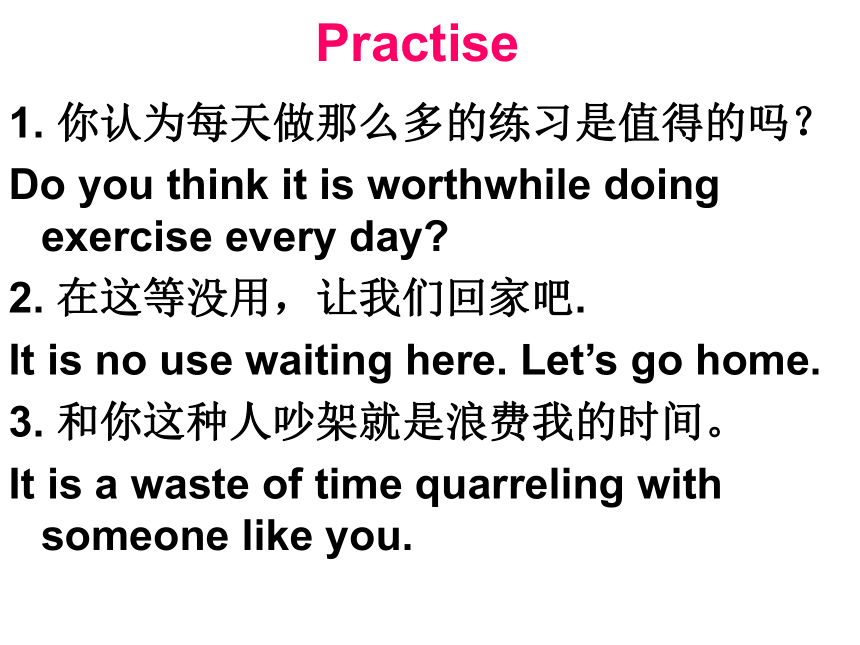
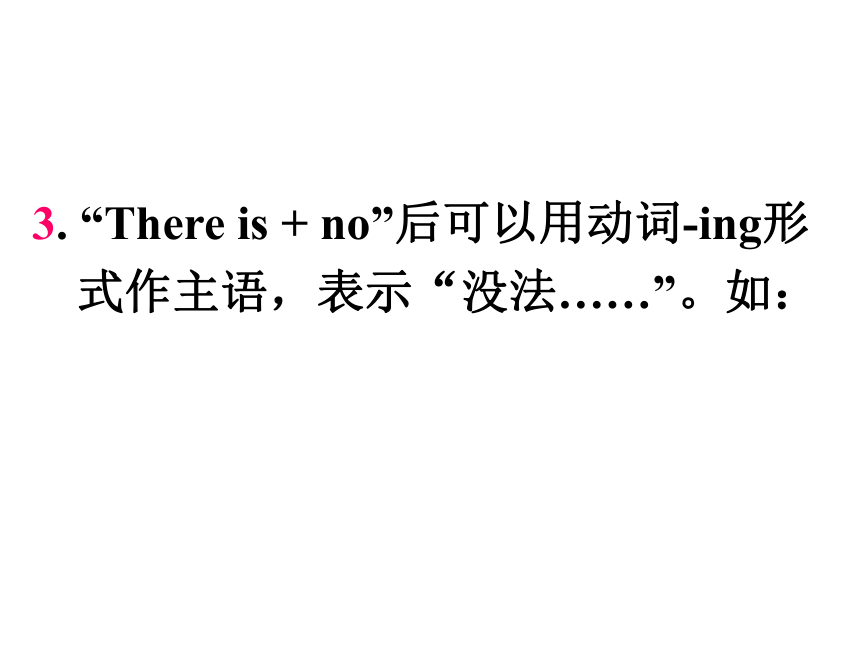
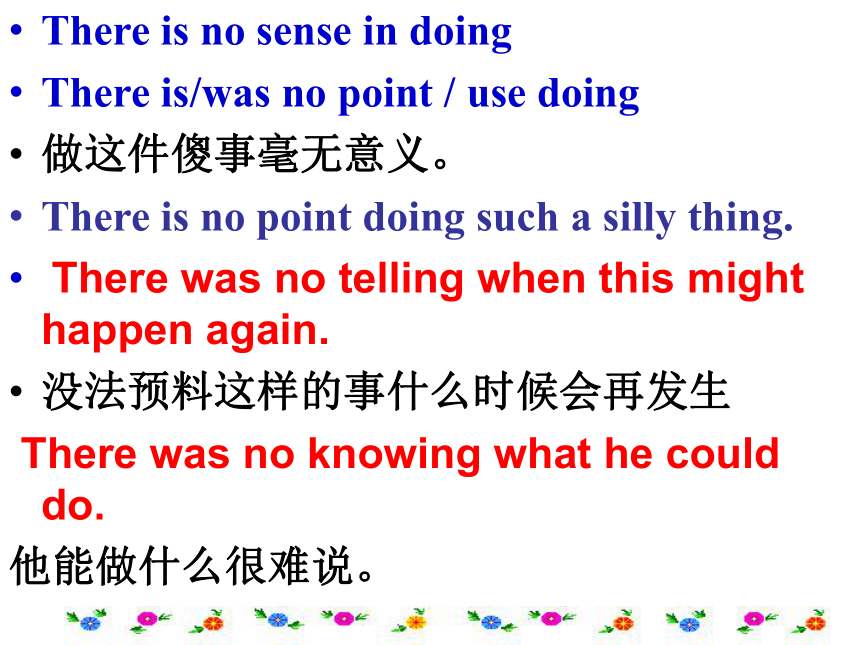
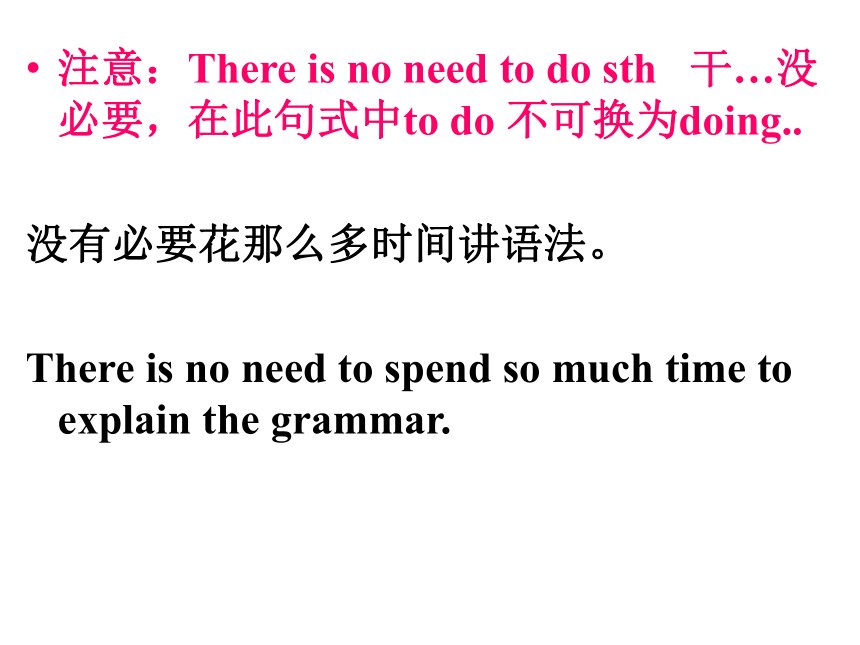

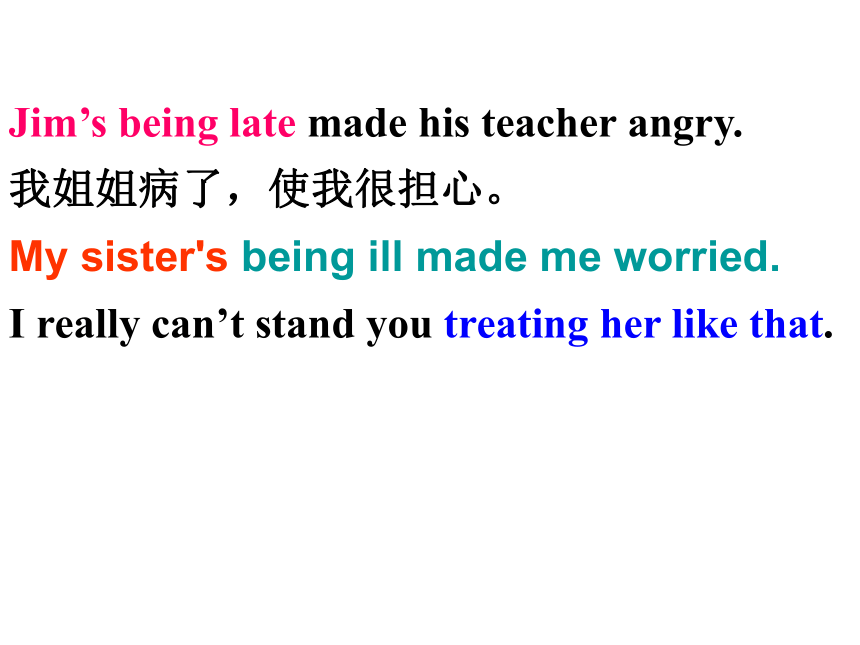
文档简介
(共44张PPT)
Grammar
动词-ing形式作主语和宾语
Verb-ing
Form
as
Subject
and
Object
动词-ing形式是在动词末尾加
-ing
,属于非谓语动词(non-predicate
verb)。
e.g.do-doing,
write-
writing
,
sit-sitting
,
etc.否定形式:not+
v--ing
构成
2.
动词-ing形式作主语或宾语时,也可称为动名词。
一
动词-ing形式作主语
1.
动词-ing形式作主语表示表示经常的、习惯性的动作或状态,
谓语动词用单数。如:
Reading
aloud
is
very
important
for
us
to
learn
a
foreign
language.
Going
to
bed
early
and
getting
up
early
is
considered
to
be
a
good
habit.
Practise
1)
捉弄别人是我们万万不能干的.
Playing
tricks
on
others
is
something
we
should
never
do.
2)学习新单词对我来说非常重要。
Learning
new
words
is
very
important
for
me.
3)说比做容易。
Talking
is
easier
than
doing.
2.
动词-ing形式作主语时常后置,
用it作形式主语,用形容词或名词作表语。常见的作表语的名词或短语有:
no
use,
no
good,
a
waste
of
time
,
worth,worthwhile
等。如:
常用-ing形式作主语的句型有:
It
+be
+a
waste
of
time
doing
做...是浪费时间的
It
is/was
no
good/use
doing
做...是没益/用处的
It
is/was
worth
/worthwhile
doing
做...是值得的
Practise
1.
你认为每天做那么多的练习是值得的吗?
Do
you
think
it
is
worthwhile
doing
exercise
every
day?
2.
在这等没用,让我们回家吧.
It
is
no
use
waiting
here.
Let’s
go
home.
3.
和你这种人吵架就是浪费我的时间。
It
is
a
waste
of
time
quarreling
with
someone
like
you.
3.
“There
is
+
no”后可以用动词-ing形式作主语,表示“没法……”。如:
There
is
no
sense
in
doing
There
is/was
no
point
/
use
doing
做这件傻事毫无意义。
There
is
no
point
doing
such
a
silly
thing.
There
was
no
telling
when
this
might
happen
again.
没法预料这样的事什么时候会再发生
There
was
no
knowing
what
he
could
do.
他能做什么很难说。
注意:There
is
no
need
to
do
sth
干…没必要,在此句式中to
do
不可换为doing..
没有必要花那么多时间讲语法。
There
is
no
need
to
spend
so
much
time
to
explain
the
grammar.
V-ing的复合形式
???
我想知道你是否介意我拖堂。
I
wonder
whether
you
mind
my
/me
delaying
class.
请原谅我的不辞而别啦。
Please
forgive
my
leaving
without
notice.
Jim’s
being
late
made
his
teacher
angry.
我姐姐病了,使我很担心。
My
sister's
being
ill
made
me
worried.
I
really
can’t
stand
you
treating
her
like
that.
2.
动词-ing形式的否定形式是在其前面加not,带有逻辑主语时not应在动词-ing形式之前。
1.
Not
cleaning
her
teeth
made
her
smell
bad.
2.
Your
schoolmate’s
not
coming
home
in
time
made
her
parents
worried.
3.
他没被汕头大学录取使亲朋好友很失望。
His
not
being
admitted
into
Shantou
University
disappointed
his
relatives
and
friends.
2、用作宾语常跟动词ing作宾语的动词歌诀:
考虑建议盼原谅,
承认推迟没得想,
避免错过继续练,
否认完成停能赏,
不禁介意准逃亡,
不准冒险凭想象。
consider,
suggest
/
advise
,look
forward
to
,excuse
,pardon
admit,
delay
/
put
off
,
fancy
avoid
,
miss
,keep
/keep
on
,practise
deny
,
finish
,
stop
,enjoy/appreciate
can’t
help
,
mind
,
allow/permit
,escape
forbid
,
risk
,
imagine
动名词的时态和语态
1.
火是凶猛的,水是柔弱的。但是更多的人死于玩水而不是玩火。
Fire
is
fierce
and
water
is
gentle.
But
more
people
die
of
playing
water
rather
than
fire.
2.
从小被浸泡在诗歌里使他身上有书虫的气质。
Being
exposed
to
poems
at
a
young
age
made
him
exude
the
taste
of
bookworm.
3.
很抱歉让你失望了。
I’m
sorry
for
having
disappointed
you.
Doing
---being
done----having
done
---having
been
done
Practice
1.他九死一生。
He
narrowly
escape
being
killed
.
2.你是否考虑过提高你的书写呢?
Have
you
considered
improving
your
handwriting?
3.
我儿子能达到我的期望真的让我很自豪。
My
son’s
living
up
to
my
expectation
really
made
me
proud.
2)在allow,
advise,
forbid,
permit后直接跟动名词作宾语,如果有名词或代词作宾语,则构成“allow/advise/forbid/permit
+名词/代词+不定式(宾语补足语)”之形式。如:
We
don't
allow
smoking
here.
We
don't
allow
anybody
to
smoke
here.
3)动词need,
require,
want意为“需要”时,后跟动名词的主动式或不定式的被动式作宾语,意义没有区别。
The
window
needs/requires/wants
cleaning/to
be
cleaned.
4)既跟动词ing又接不定式作宾语的动词歌诀:
双方一旦开始,不论喜欢与否,都得继续下去。
不管记住与否,努力打算停止,后悔三个需要。
begin,
start,
like,
prefer,
hate,
dislike,
continue.
remember,
forget,
try,
mean,
stop,
reget,
want,
need,
require
几组词的区别
·A.在like,love,hate,prefer等动词之后,用-ing或不定式意义上没有什么不同,只是侧重点有些不同,动名词表示泛指的动作,不定式表示具体的一次性动作。
B.在begin/start,continue之后,用动名词和不定式,意义无甚区别,尤其是当主语是人的时候。
C.在动词forget,remember,regret之后,用动名词与不定式意义不同。动名词表示动作先于谓语发生,不定式表示后于谓语动作,如:
我记得我已把信寄了。
I
remember
posting
the
letter.
我会记着去寄信的。
I’ll
remember
to
post
the
letter.
我永远不会忘记见到过那位著名作家。
I
shall
never
forget
seeing
the
famous
writer.
不要忘了给你母亲写信。
Don’t
forget
to
write
to
your
mother.
我真后悔没赶上那次报告会。
I
regret
missing
the
report.
我遗憾地告诉你我不能接受你的建议。
I
regret
to
say
I
can’t
take
your
advice.
D.在try,mean之后,意义各不相同,如try
to
do
(设法),try
doing
(试试),mean
to
do
(打算,有意要做),mean
doing
(意思是,意味着)。如:
我们必须设法及时把一切搞好。
We
must
try
to
get
everything
done
in
time.
我们用别的方法做这工作试试。
Let’s
try
doing
the
work
in
some
other
ways.
我并不想叫你生气。
I
didn’t
mean
to
make
you
angry.
你的计划意味着要花费几个小时。
Your
plan
would
mean
spending
hours.
E·go
on
doing
和go
on
to
do
Go
on
doing继续做一直在做的事;go
on
to
do接着做另一件事。如:
请继续做这同一个练习。
Please
go
on
doing
the
same
exercise.
请做另外一个练习。
Please
go
on
to
do
the
other
exercise.
F.stop
doing与stop
to
do:
Stop
doing停止做,stop
to
do停下正在干的事去干另一件事。如:
我们停止了交谈。
We
stopped
talking.
我们停了下来去谈话。
We
stopped
to
talk.
3.作介词宾语
下列短语中的to都是介词,所以后面跟名词或-ing形式:devote
to,object
to,pay
attention
to,get
down
to,lead
to,
look
forward
to,stick
to,be
used
to等
常跟不定式作宾语的动词歌诀:
三个希望两答应,
两个要求莫拒绝,
设法学会做决定,
不要假装在选择。
hope;
wish;
want
;
agree;
promise
demand;
ask;
refuse
manage;
learn;
decide
pretend
;
choose
想要拒绝命令,
需要努力学习,
期望同意帮助,
希望决定开始。
want
;
refuse
;
order
need;
try
;
learn
expect
;
agree
;
help
hope
;
wish
;
decide
;
begin
;start
【考例】
1.
—
What
do
you
think
made
Mary
so
upset?
—
__________
her
new
bicycle.
A.
As
she
lost??
B.
Lost
C.
Losing??????
D.
Because
of
losing
【考例】
5.
I
can‘t
imagine
__________
that
with
them.
A.
do??????????
B.
to
do
C.
being
done?
?
D.
doing
6.
She
looks
forward
every
spring
to
__________
the
flower-lined
garden.
A.
visit
B.
paying
a
visit
C.
walk
in
D.
walking
in
解析:考查短语动词
look
forward
to
后跟动名词作宾语的用法。
【考例】
8.—
Let's
have
a
rest.
—
Not
now.I
don‘t
want
to
stop
__________
yet.
A.
study?????????
B.
to
study
C.
for
studying???
D.
studying
解析:stop
studying意为“停止学习”。
9.—
Let
me
tell
you
something
about
the
journalists.
—
Don‘t
you
remember
________
me
the
story
yesterday?
A.
told??????
B.
telling
C.
to
tell??
D.
to
have
told
解析:
remember
telling
me意为
“记得曾经告诉过我”。
1.出国旅行是很激动人心的。
2
在这儿等是没用的,
我们走吧。
3
我记得在哪里见过他。
4
我后悔没听你的劝告。
5
帮助别人就是帮助你自己。
Travelling
abroad
is
very
exciting.
It’s
no
use
waiting
here.
Let’s
go.
I
remember
seeing
him
somewhere.
I
regret
not
following
your
advice.
Helping
others
means
helping
yourself.
Translation
10.
It
took
the
workmen
only
two
hours
to
finish
_______
my
car.
A.
repairing
B.
repair
C.
to
repair
D.
repaired
11.
The
classroom
wants
_____.
A.
clean
B.
cleaned
C.
to
clean
D.
cleaning
12.
Jack
said
that
he
wouldn't
mind
__
for
us.
A.
to
wait
B.
wait
C.
waiting
D.
waited
13.
My
brother
keeps
___
me
with
my
work.
A.
to
help
B.
help
C.
helping
D.
helped
14.
We
should
often
practise
___
English
with
each
other.
A.
to
speak
B.
spoke
C.
speak
D.
speaking
15.
Keep
on
____
and
you
will
succeed.
A.
a
try
B.
try
C.
triing
D.
trying
16.
His
parents
insist
on
___
to
college.
A.
he
should
go
B.
he
go
C.
his
going
D.
him
to
go
17.
The
story
was
so
funny
that
we
___.
A.
couldn’t
help
laugh
B.
can’t
but
laugh
C.
couldn’t
help
laughing
D.
couldn’t
help
but
to
laugh
18.
Though
it
sounds
a
bit
too
dear
(昂贵),
it
is
worth
______.
A.
being
bought
B.
buying
C.
to
buy
D.
buying
it
19.
He
devoted
his
life
to
_____
the
atomic
theory.
A.
study
B.
be
studied
C.
studying
D.
have
studied
20.
You
must
pay
attention
to
___
the
works
of
Lu
Xun.
A.
read
B.
reading
C.
reader
D.
be
read
21.
You
should
work
tonight
instead
of
_____
TV.
A.
to
watch
B.
you
watching
C.
you
watch
D.
watching
22.
I
remembered
____
this
person
somewhere
before.
A.
seeing
B.
having
been
seen
C.
seen
D.
to
see
23.
I
regret
____
that
to
her.
A.
having
said
B.
to
have
said
C.
to
say
D.
X
24.
The
patient
must
be
separated
to
avoid
(避免)
____
others.
A.
being
infected(感染)
B.
infecting
C.
to
infect
D.
infected
25.
_____
provides
us
with
essential
nutrients
(营养),
while
______
provides
us
with
oxygen.
A.
To
eat;
breathing
B.
Eating;
to
breathe
C.
Eating;
breathing
D.
Eaten;
breathed
26.
He
attended
the
party
without___.
A.
invited
B.
inviting
C.
having
invited
D.
being
invited
27.
By
____,
water
can
be
changed
into
gas.
A.
heating
B.
being
heated
C.
having
heated
D.
heated
28.
On
land
many
objects
prevent
sound
_____
very
far.
A.
to
travel
B.
travel
C.
from
travelling
D.
to
travelling
29.
She
returned
home
only
to
find
the
door
open
and
something____
.
A.
missed
B.
to
be
missing
C.
missing
D.
to
be
missed
30.
Writing
stories
and
articles__
what
I
enjoy
most.
A.
is
B.
are
C.
was
D.
were
Grammar
动词-ing形式作主语和宾语
Verb-ing
Form
as
Subject
and
Object
动词-ing形式是在动词末尾加
-ing
,属于非谓语动词(non-predicate
verb)。
e.g.do-doing,
write-
writing
,
sit-sitting
,
etc.否定形式:not+
v--ing
构成
2.
动词-ing形式作主语或宾语时,也可称为动名词。
一
动词-ing形式作主语
1.
动词-ing形式作主语表示表示经常的、习惯性的动作或状态,
谓语动词用单数。如:
Reading
aloud
is
very
important
for
us
to
learn
a
foreign
language.
Going
to
bed
early
and
getting
up
early
is
considered
to
be
a
good
habit.
Practise
1)
捉弄别人是我们万万不能干的.
Playing
tricks
on
others
is
something
we
should
never
do.
2)学习新单词对我来说非常重要。
Learning
new
words
is
very
important
for
me.
3)说比做容易。
Talking
is
easier
than
doing.
2.
动词-ing形式作主语时常后置,
用it作形式主语,用形容词或名词作表语。常见的作表语的名词或短语有:
no
use,
no
good,
a
waste
of
time
,
worth,worthwhile
等。如:
常用-ing形式作主语的句型有:
It
+be
+a
waste
of
time
doing
做...是浪费时间的
It
is/was
no
good/use
doing
做...是没益/用处的
It
is/was
worth
/worthwhile
doing
做...是值得的
Practise
1.
你认为每天做那么多的练习是值得的吗?
Do
you
think
it
is
worthwhile
doing
exercise
every
day?
2.
在这等没用,让我们回家吧.
It
is
no
use
waiting
here.
Let’s
go
home.
3.
和你这种人吵架就是浪费我的时间。
It
is
a
waste
of
time
quarreling
with
someone
like
you.
3.
“There
is
+
no”后可以用动词-ing形式作主语,表示“没法……”。如:
There
is
no
sense
in
doing
There
is/was
no
point
/
use
doing
做这件傻事毫无意义。
There
is
no
point
doing
such
a
silly
thing.
There
was
no
telling
when
this
might
happen
again.
没法预料这样的事什么时候会再发生
There
was
no
knowing
what
he
could
do.
他能做什么很难说。
注意:There
is
no
need
to
do
sth
干…没必要,在此句式中to
do
不可换为doing..
没有必要花那么多时间讲语法。
There
is
no
need
to
spend
so
much
time
to
explain
the
grammar.
V-ing的复合形式
???
我想知道你是否介意我拖堂。
I
wonder
whether
you
mind
my
/me
delaying
class.
请原谅我的不辞而别啦。
Please
forgive
my
leaving
without
notice.
Jim’s
being
late
made
his
teacher
angry.
我姐姐病了,使我很担心。
My
sister's
being
ill
made
me
worried.
I
really
can’t
stand
you
treating
her
like
that.
2.
动词-ing形式的否定形式是在其前面加not,带有逻辑主语时not应在动词-ing形式之前。
1.
Not
cleaning
her
teeth
made
her
smell
bad.
2.
Your
schoolmate’s
not
coming
home
in
time
made
her
parents
worried.
3.
他没被汕头大学录取使亲朋好友很失望。
His
not
being
admitted
into
Shantou
University
disappointed
his
relatives
and
friends.
2、用作宾语常跟动词ing作宾语的动词歌诀:
考虑建议盼原谅,
承认推迟没得想,
避免错过继续练,
否认完成停能赏,
不禁介意准逃亡,
不准冒险凭想象。
consider,
suggest
/
advise
,look
forward
to
,excuse
,pardon
admit,
delay
/
put
off
,
fancy
avoid
,
miss
,keep
/keep
on
,practise
deny
,
finish
,
stop
,enjoy/appreciate
can’t
help
,
mind
,
allow/permit
,escape
forbid
,
risk
,
imagine
动名词的时态和语态
1.
火是凶猛的,水是柔弱的。但是更多的人死于玩水而不是玩火。
Fire
is
fierce
and
water
is
gentle.
But
more
people
die
of
playing
water
rather
than
fire.
2.
从小被浸泡在诗歌里使他身上有书虫的气质。
Being
exposed
to
poems
at
a
young
age
made
him
exude
the
taste
of
bookworm.
3.
很抱歉让你失望了。
I’m
sorry
for
having
disappointed
you.
Doing
---being
done----having
done
---having
been
done
Practice
1.他九死一生。
He
narrowly
escape
being
killed
.
2.你是否考虑过提高你的书写呢?
Have
you
considered
improving
your
handwriting?
3.
我儿子能达到我的期望真的让我很自豪。
My
son’s
living
up
to
my
expectation
really
made
me
proud.
2)在allow,
advise,
forbid,
permit后直接跟动名词作宾语,如果有名词或代词作宾语,则构成“allow/advise/forbid/permit
+名词/代词+不定式(宾语补足语)”之形式。如:
We
don't
allow
smoking
here.
We
don't
allow
anybody
to
smoke
here.
3)动词need,
require,
want意为“需要”时,后跟动名词的主动式或不定式的被动式作宾语,意义没有区别。
The
window
needs/requires/wants
cleaning/to
be
cleaned.
4)既跟动词ing又接不定式作宾语的动词歌诀:
双方一旦开始,不论喜欢与否,都得继续下去。
不管记住与否,努力打算停止,后悔三个需要。
begin,
start,
like,
prefer,
hate,
dislike,
continue.
remember,
forget,
try,
mean,
stop,
reget,
want,
need,
require
几组词的区别
·A.在like,love,hate,prefer等动词之后,用-ing或不定式意义上没有什么不同,只是侧重点有些不同,动名词表示泛指的动作,不定式表示具体的一次性动作。
B.在begin/start,continue之后,用动名词和不定式,意义无甚区别,尤其是当主语是人的时候。
C.在动词forget,remember,regret之后,用动名词与不定式意义不同。动名词表示动作先于谓语发生,不定式表示后于谓语动作,如:
我记得我已把信寄了。
I
remember
posting
the
letter.
我会记着去寄信的。
I’ll
remember
to
post
the
letter.
我永远不会忘记见到过那位著名作家。
I
shall
never
forget
seeing
the
famous
writer.
不要忘了给你母亲写信。
Don’t
forget
to
write
to
your
mother.
我真后悔没赶上那次报告会。
I
regret
missing
the
report.
我遗憾地告诉你我不能接受你的建议。
I
regret
to
say
I
can’t
take
your
advice.
D.在try,mean之后,意义各不相同,如try
to
do
(设法),try
doing
(试试),mean
to
do
(打算,有意要做),mean
doing
(意思是,意味着)。如:
我们必须设法及时把一切搞好。
We
must
try
to
get
everything
done
in
time.
我们用别的方法做这工作试试。
Let’s
try
doing
the
work
in
some
other
ways.
我并不想叫你生气。
I
didn’t
mean
to
make
you
angry.
你的计划意味着要花费几个小时。
Your
plan
would
mean
spending
hours.
E·go
on
doing
和go
on
to
do
Go
on
doing继续做一直在做的事;go
on
to
do接着做另一件事。如:
请继续做这同一个练习。
Please
go
on
doing
the
same
exercise.
请做另外一个练习。
Please
go
on
to
do
the
other
exercise.
F.stop
doing与stop
to
do:
Stop
doing停止做,stop
to
do停下正在干的事去干另一件事。如:
我们停止了交谈。
We
stopped
talking.
我们停了下来去谈话。
We
stopped
to
talk.
3.作介词宾语
下列短语中的to都是介词,所以后面跟名词或-ing形式:devote
to,object
to,pay
attention
to,get
down
to,lead
to,
look
forward
to,stick
to,be
used
to等
常跟不定式作宾语的动词歌诀:
三个希望两答应,
两个要求莫拒绝,
设法学会做决定,
不要假装在选择。
hope;
wish;
want
;
agree;
promise
demand;
ask;
refuse
manage;
learn;
decide
pretend
;
choose
想要拒绝命令,
需要努力学习,
期望同意帮助,
希望决定开始。
want
;
refuse
;
order
need;
try
;
learn
expect
;
agree
;
help
hope
;
wish
;
decide
;
begin
;start
【考例】
1.
—
What
do
you
think
made
Mary
so
upset?
—
__________
her
new
bicycle.
A.
As
she
lost??
B.
Lost
C.
Losing??????
D.
Because
of
losing
【考例】
5.
I
can‘t
imagine
__________
that
with
them.
A.
do??????????
B.
to
do
C.
being
done?
?
D.
doing
6.
She
looks
forward
every
spring
to
__________
the
flower-lined
garden.
A.
visit
B.
paying
a
visit
C.
walk
in
D.
walking
in
解析:考查短语动词
look
forward
to
后跟动名词作宾语的用法。
【考例】
8.—
Let's
have
a
rest.
—
Not
now.I
don‘t
want
to
stop
__________
yet.
A.
study?????????
B.
to
study
C.
for
studying???
D.
studying
解析:stop
studying意为“停止学习”。
9.—
Let
me
tell
you
something
about
the
journalists.
—
Don‘t
you
remember
________
me
the
story
yesterday?
A.
told??????
B.
telling
C.
to
tell??
D.
to
have
told
解析:
remember
telling
me意为
“记得曾经告诉过我”。
1.出国旅行是很激动人心的。
2
在这儿等是没用的,
我们走吧。
3
我记得在哪里见过他。
4
我后悔没听你的劝告。
5
帮助别人就是帮助你自己。
Travelling
abroad
is
very
exciting.
It’s
no
use
waiting
here.
Let’s
go.
I
remember
seeing
him
somewhere.
I
regret
not
following
your
advice.
Helping
others
means
helping
yourself.
Translation
10.
It
took
the
workmen
only
two
hours
to
finish
_______
my
car.
A.
repairing
B.
repair
C.
to
repair
D.
repaired
11.
The
classroom
wants
_____.
A.
clean
B.
cleaned
C.
to
clean
D.
cleaning
12.
Jack
said
that
he
wouldn't
mind
__
for
us.
A.
to
wait
B.
wait
C.
waiting
D.
waited
13.
My
brother
keeps
___
me
with
my
work.
A.
to
help
B.
help
C.
helping
D.
helped
14.
We
should
often
practise
___
English
with
each
other.
A.
to
speak
B.
spoke
C.
speak
D.
speaking
15.
Keep
on
____
and
you
will
succeed.
A.
a
try
B.
try
C.
triing
D.
trying
16.
His
parents
insist
on
___
to
college.
A.
he
should
go
B.
he
go
C.
his
going
D.
him
to
go
17.
The
story
was
so
funny
that
we
___.
A.
couldn’t
help
laugh
B.
can’t
but
laugh
C.
couldn’t
help
laughing
D.
couldn’t
help
but
to
laugh
18.
Though
it
sounds
a
bit
too
dear
(昂贵),
it
is
worth
______.
A.
being
bought
B.
buying
C.
to
buy
D.
buying
it
19.
He
devoted
his
life
to
_____
the
atomic
theory.
A.
study
B.
be
studied
C.
studying
D.
have
studied
20.
You
must
pay
attention
to
___
the
works
of
Lu
Xun.
A.
read
B.
reading
C.
reader
D.
be
read
21.
You
should
work
tonight
instead
of
_____
TV.
A.
to
watch
B.
you
watching
C.
you
watch
D.
watching
22.
I
remembered
____
this
person
somewhere
before.
A.
seeing
B.
having
been
seen
C.
seen
D.
to
see
23.
I
regret
____
that
to
her.
A.
having
said
B.
to
have
said
C.
to
say
D.
X
24.
The
patient
must
be
separated
to
avoid
(避免)
____
others.
A.
being
infected(感染)
B.
infecting
C.
to
infect
D.
infected
25.
_____
provides
us
with
essential
nutrients
(营养),
while
______
provides
us
with
oxygen.
A.
To
eat;
breathing
B.
Eating;
to
breathe
C.
Eating;
breathing
D.
Eaten;
breathed
26.
He
attended
the
party
without___.
A.
invited
B.
inviting
C.
having
invited
D.
being
invited
27.
By
____,
water
can
be
changed
into
gas.
A.
heating
B.
being
heated
C.
having
heated
D.
heated
28.
On
land
many
objects
prevent
sound
_____
very
far.
A.
to
travel
B.
travel
C.
from
travelling
D.
to
travelling
29.
She
returned
home
only
to
find
the
door
open
and
something____
.
A.
missed
B.
to
be
missing
C.
missing
D.
to
be
missed
30.
Writing
stories
and
articles__
what
I
enjoy
most.
A.
is
B.
are
C.
was
D.
were
同课章节目录
